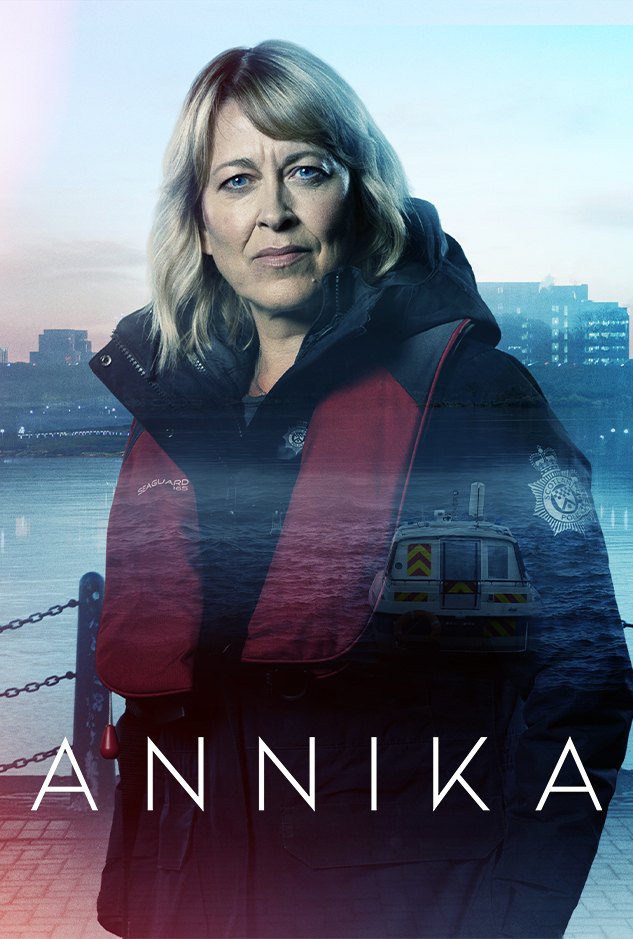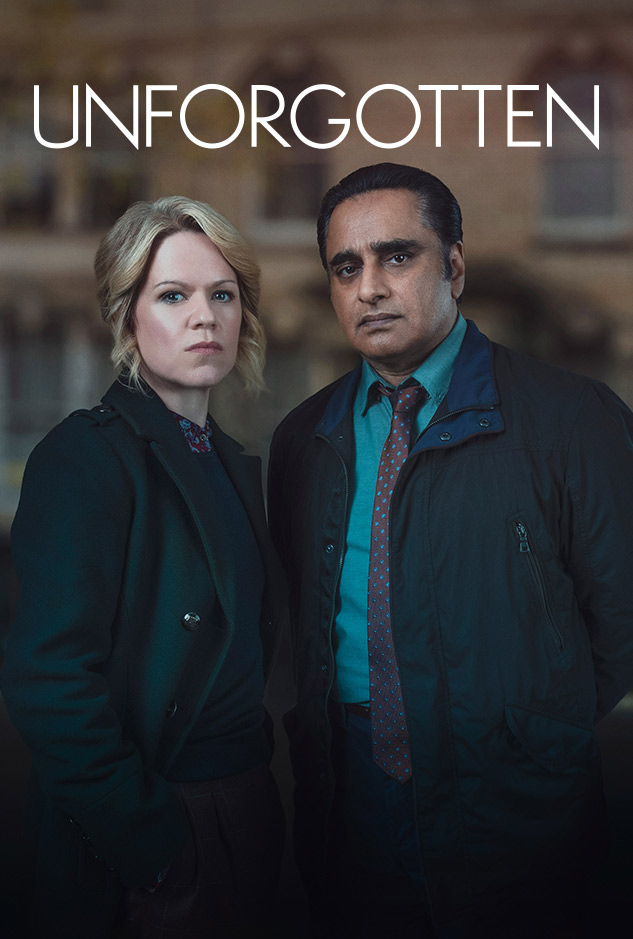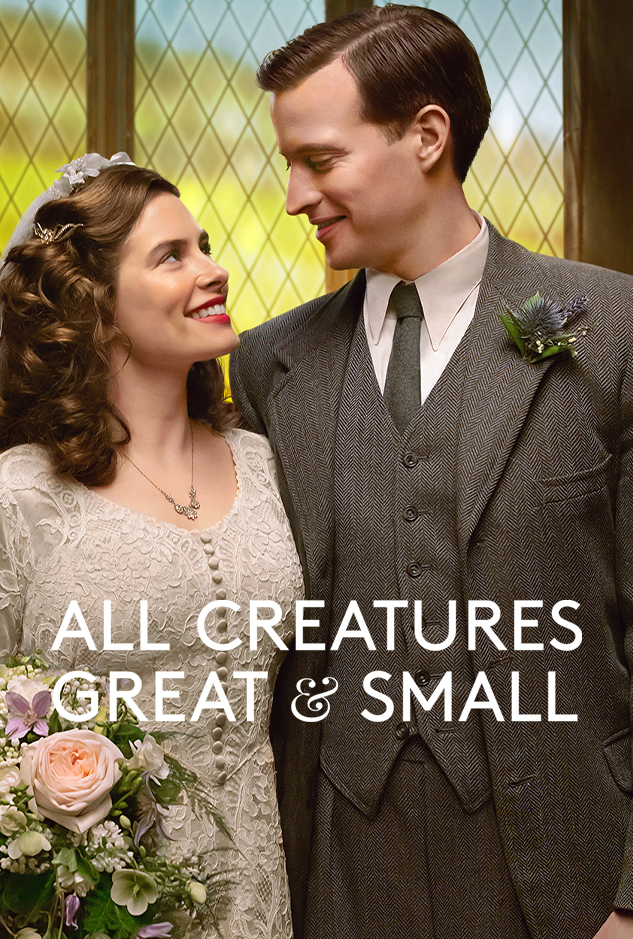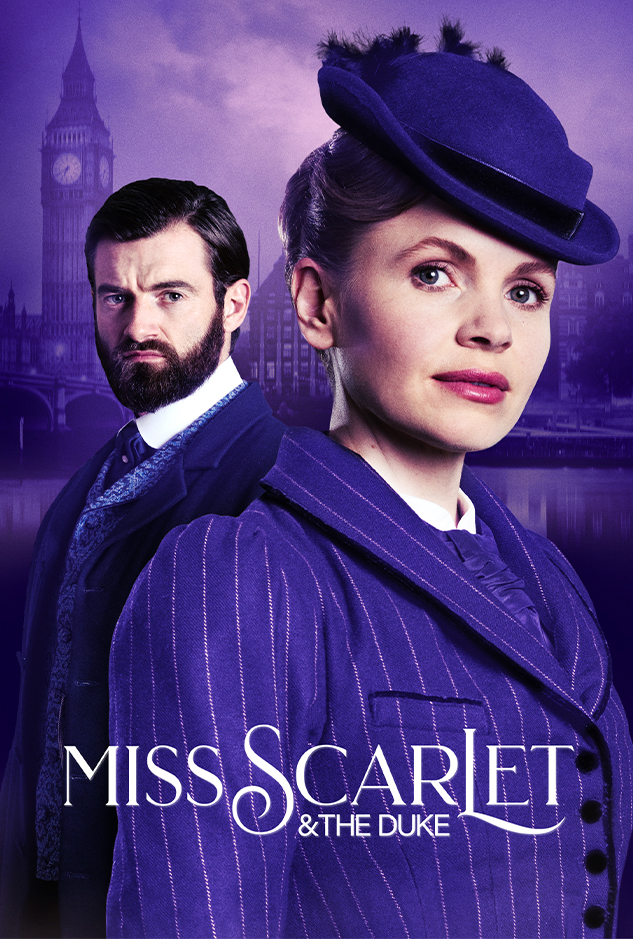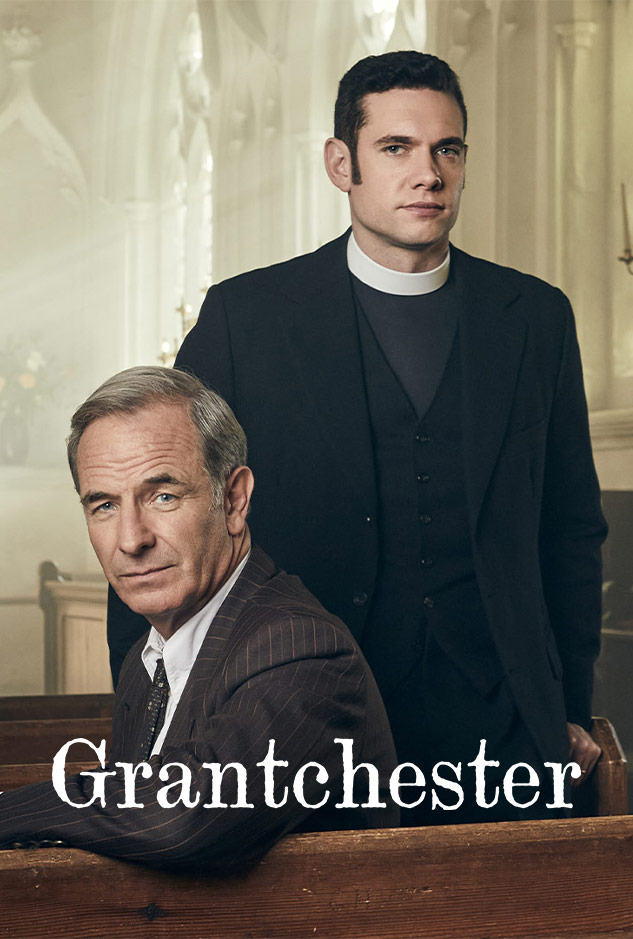Anna Madeley Answers Fans’ Mrs. Hall Questions
All Creatures Great and Small‘s housekeeper Mrs. Hall isn’t the only one with all the answers. Anna Madeley, the actress who plays her, answered a slew of Season 2 fan questions with the same generosity and thoughtfulness as her character. From Mrs. Hall’s romantic prospects and backstory to Anna Madeley’s baking skills and accent work, she’s got the answers, and we’ve got you covered.
[Contains Episode 7 spoilers.]
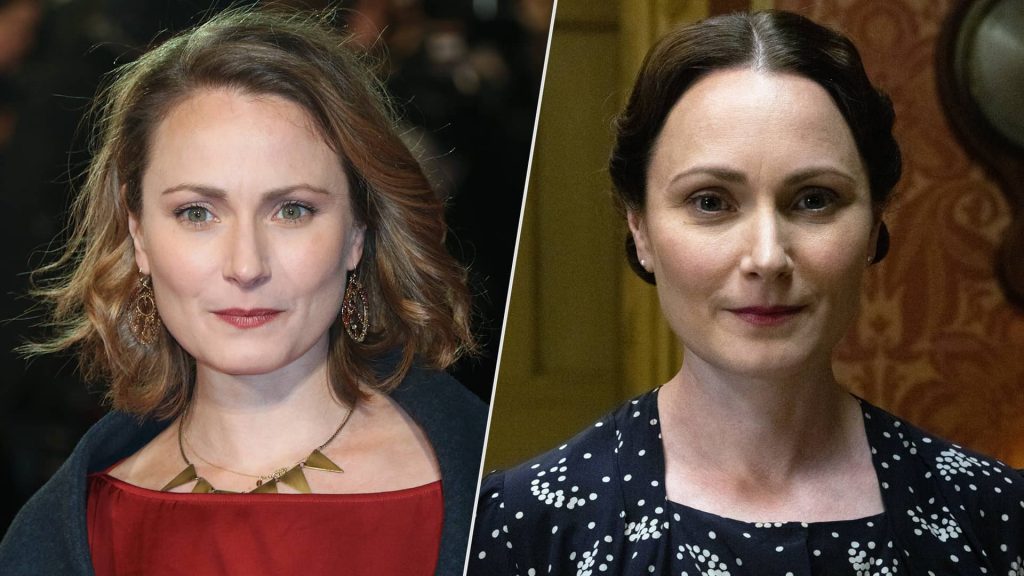

Too many viewers to name here wrote in to express that they want a Mrs. Hall/Siegfried romance, or that it’s high time that she and Gerald get together. So we are all wondering, is love in the cards for Mrs. Hall, and if yes, with whom?
Oh gosh, I hope so, but I don’t completely know. Ultimately, that’s a Ben Vanstone [head writer and Executive Producer] question and he probably wouldn’t give us the answer, would he? I think they’re both rather wonderful relationships. The relationship with Mr. Farnon is so complex because there’s so many layers to it, in that he employs her in the house, as well as that they have a real fondness for each other, and they are very good friends to one another. You can see where there’d be potential there. Then with Gerald, he’s the first person that comes along that you really see in another way, helping Mrs. Hall out. He’s someone who wants to engage and be helpful to her. It’s interesting, that relationship with Gerald, where they share an era together—they’ve grown up in the same world, and they can share a wartime memory together and just have some gentle fun together, as well. I think those things are all very intriguing about how this progresses.
But of course, we can’t forget that Mrs. Hall is technically still married, so that complicates her world enormously. This is a tricky time for that. You’ve met Diana Brompton, who’s divorced, and who’s quite a modern woman taking on the new idea. But it was only in 1937 that, legally, Mrs. Hall would’ve been able to get divorced without having to go down the “let’s pretend one of us has been unfaithful” route. It’s a very new idea. I think it was in 1937 that it extended to if you’ve been deserted for over three years or if your partner was incurably insane. I think the cultural move to thinking about getting divorced is absolutely huge. We haven’t discussed that yet for Mrs. Hall, but I think the fact that Diana Brompton did it is quite a thing to take in—it’s quite a bold move at that time. So whether Mrs. Hall’s in a place to consider doing that is a big question, again, for Ben Vanstone. I don’t know what he’ll do with that.
Dorothy H. of Fort Worth, TX is curious about what might contribute to Mrs. Hall’s reluctance to enter a romantic relationship (beyond that big hurdle of still being married).
I think the arrival of Gerald actually takes her by surprise. We’ve seen her on a bit of a journey through Season 1, and then in Season 2, I feel like she’s very present and she’s very able to enjoy her life there. She’s quite independent. As a woman at that time, she would have got married and had her son quite young. And he’s a grown man now, so I wonder whether being able to just be in charge of her own life, in a way, is quite an interesting place to be. But then, it immediately opens up other doors, doesn’t it—once you think you’ve moved on from somewhere, suddenly other door is open.
I think Gerald is a surprise in that he awakens a side of her that she perhaps has slightly forgotten about. The idea that other people might start to say, “Oh, is he your gentleman friend?” is all slightly uncomfortable, slightly exciting territory. I don’t think it’s that she doesn’t want to open up that side of herself, but I just think it’s been a long time since she’s been able to have space to, I suppose, prioritize herself in that way. She’s been a mother and a wife, and now she’s taken the huge job being housekeeper at Skeldale, so to have the time and space to actually think about herself in that way is a new thing. I’m excited about that opening up for her, I think she deserves it.


Barbara E. from Minneapolis, MN wonders what it would be like for Mrs. Hall to be in need, vulnerable, and actually accept help from others.
That’s an interesting question, because I think she’d quite struggle with it. I think she’s a very capable woman who copes, gets on with things, is very able to see other people’s dilemmas, and is very front-foot about helping with them where she can. But I think the idea that she might not quite understand or be able to deal with her own problems—that’s a tricky one. I think she’s probably quite private on that front. I imagine friendships with people like Dorothy are very much treasured. Someone like Dorothy would know all her intimate secrets, she’d be a real confidant for her, whereas I think she’d be quite private outside that realm of very close friendship.
And even seeing Gerald come in and offer to wash up, I just think it’s unheard of for someone to do that at Skeldale House, really, so it’s a shock to her, to accept that kind of help. That’s not to say it’s not appreciated, but I don’t think she knows how to handle it.


Rebecca K. of Warrington, PA asks how Mrs. Hall can be so calm and supportive, even when she’s suffering disappointment of her own or loneliness?
I was intrigued by this question because I was thinking about it in terms of how it was such a different time, in terms of how much people had to deal with. I think life was a lot quieter back then. Our lives now are very busy and noisy, and in Mrs Hall’s world, apart from the bit of radio that she might have on sometimes, it’s very quiet. You’ve got time to think and observe in a way that perhaps we don’t have quite so much, now. And I think that’s an important thing in understanding how she’s able to look at and understand situations—there’s not too much going on, in that sense. I also wonder whether there’s a level in which—because this is a surrogate family, it’s not actual family—she comes to it in a slightly different way, able to see people with a little bit more distance, at the same time as being incredibly fond of them. Perhaps it is a slightly different relationship.
But I think she’s just a rather special person in that way. There’s a mixture of being a little bit private about her life, but also assuming the best of people and looking for a resolution to dilemmas. She doesn’t always get it right—she sometimes puts her foot in it or gets the wrong idea—but there’s a clarity to her thinking. She’s uncluttered by sort of unnecessary thinking about things, and I think it must be to do with that sense of having that much more space and time. If you imagine going for a walk on the Dales, that would clear your head, but I just think life was a lot quieter then. I think it was only in the late ’30s that Muzak was invented, so if you think about it, even shops are quiet. You can go for quiet walks, you can hear the birdsong. I just think you have more space and time to process your life and what’s going on in it. And being someone who works alone at home most of the day, I think that kind of quietness must quite suit her as well, because I think she’s very happy in that job. I think she loves being a surrogate mom to them.
“I hope to become more like Mrs. Hall as I grow up.”
Abby N. remarked that she sees Mrs. Hall as a strong mother figure, and wonders if you’ve drawn from any mothers in your life, or from being a mother yourself.
Probably all of the above. Yes, I agree, she is a strong mother figure. I think she has that wisdom in the same way that the vets do, in terms of them knowing when to intervene and when not to, and what the best course of action is. She applies that same thinking with people. She knows when to have a word with Tristan and when to leave-be—I think she has good instincts on that front. Also, she’s been a mother and brought someone up to adulthood, and so she’s been on that journey. I’m in the middle of that journey myself. It’s a huge learning curve, isn’t it? You’ve got to appreciate your parents in a whole new light, because you didn’t realize quite what the job was that they did.
Also, looking at the generation of my family that were alive at that time, people got on with it, really worked hard, and did their best with whatever the situation was that they had. Those examples have been set to me, in terms of women just getting on with it. This comes up a lot for Rachel [Shenton] and me playing the female characters in the series. People talk about the “strong women,” and we find ourselves thinking, “Well, actually I think it is equality, and a lot of women, they just get on with it. When the job needs doing, you do it. When you’ve got to step up for your children, or whoever it is, you do it.” I think these are two women that both do that in spades—they just step into what whatever needs doing, I suppose. I hope to become more like Mrs. Hall as I grow up.
Don’t we all! Too many viewers to mention had questions about Mrs. Hall’s backstory, wanting to know more about her life as a young woman and mother; how she came to Skeldale House; her marital status; whether we’ll get to see Edward? I suspect Ben Vanstone has the answers, but we’d love to hear your thoughts about her past.
Yes, Ben would obviously know a lot more about the actual process—he’d done all that work before I came on the scene, in terms of the actual writing and sitting down and working out the backstory. But the idea generally came from Ben’s vision of creating this surrogate family. Our Siegfried, our Mr. Farnon, is older than the character in the books, and bringing Mrs. Hall a little younger adds another generation into the stories and it gives those surrogate parents to the story. And I think having Mrs. Hall at the center of that household really opens up the emotional life—that as that mother figure, she’s the one asking people what’s going on. From a writing perspective, it’s very useful to have that character in there, but I think it also opens up that world.
Mrs. Hall is there in the books, but you never really get to know her. But being curious about who that character is and the huge role that she plays in making that practice work—I think it’s rather wonderful to acknowledge that and then bring it to the fore in asking, “Could Skeldale House really function without Mrs. Hall?” No, it couldn’t. Then, to be able to have fun with it. She’s a character who likes to have fun; she adores Tristan and his mischief. I think all that was Ben’s vision, and it really opened up how you get into that house. It’s very easy to spend your time with these fascinating stories out of the house, but it really brings to life the actual home that they all come from, and therefore what it’s like for them, as the vets, dealing with all these different stories. You get extra layers and perspectives on that.
I also suppose that it acknowledges the fact that Mrs. Hall plays many different roles in the house. She is this mother figure, but she’s also essentially the receptionist, the cleaner, and the cook, with a bit of bookkeeping thrown in. With all those many hats that she wears, it gets quite interesting. There’s plenty of businesses that have that story of a woman there doing a lot of work to make things happen, that a lot of people can relate to. I love that Ben’s not just acknowledged that, but also brought out this fully developed character who’s a lot of fun to be with, as well.


Speaking of all the hats Mrs. Hall wears, many viewers, including Sheryl W. from Chesterfield, MO and Kathy C. from Kingman, AZ are in awe of all the work she does and want to know, how on Earth does she do it all?
I think there’s a “slow and steady wins the race” approach, where if you have those skills and you do them every day, you get really good at them. It is another time, and every day would involve going and doing some sort of shopping locally. There’s no fridge in the house; everything’s fresh baked, and it is a lot of work that’s just ongoing. You don’t stop—you get up early, you start, you go, you keep going. It’s possible that she’d get help with things like the laundry, because at that time, a lot of women would’ve taken in other people’s laundry to make some extra money. But I think it’s just a matter of keeping going—you have your routine of what you do every day and you have a lot of structure to that. I think Mrs. Hall would know the meal plan for the week and which day she was cleaning what, and the day would be full of that. I don’t think she takes a huge amount of time out for herself.


Speaking of all her hard work, Jeanne P. from Lexington, KY wants to know if you enjoy cooking and baking, given that Mrs. Hall is so good at it.
I do, but I wish I was as good as Mrs. Hall. I did a bit more actually during lockdown, I ventured out. I tried to make a beef Wellington because she makes one for Tristan, and it’s a day’s work. I was like, “Goodness, it’s serious business!” I remember when I visited my grandmother, she would always make us a chocolate cake and it would always be exactly the same height—she’d obviously perfected the raising of the sponge perfectly. I think it’s probably like that with Mrs. Hall, she does this because it’s what she does all the time, and she enjoys doing it. As a very capable, bright woman, she hones these skills. I couldn’t claim to cook to the standard of Mrs. Hall, but I do like to do it and I love to bake. I’m hopefully passing that on to my next generation as well.
Beth K. from Brooklyn, NY asks if you’ve had to learn to use any old “technologies” to portray Mrs. Hall getting her work done.
A little bit, things like the AGA [century-old British cast iron stove]. I’ve never cooked on an AGA, but the basic idea is pretty easy to learn. As an actor playing Mrs. Hall, what you have to remember is that things aren’t actually hot or steaming, so you have the extra layer of identifying in reality which bits would be hot, and then remembering which things I’d need a cloth to pick up because they’ll be hot, which things are fine; which things need a mat underneath them on the table, which things don’t. Part of the job as an actor becomes about the storytelling of the AGA, because obviously it’s not really operating. I’m spoiling the mystery here! It’s more the acting skills of it, little things, like I was very grateful that I’d learned to knit when I was younger, because obviously Mrs. Hall’s a knitter, and so that’s come up. And things like sewing—those useful skills, like knowing how to darn on a darning egg. There’s lots of things like that.
I’m hoping we might see some dressmaking at some point. The sewing machine is there, and I was aware of thinking, “Well, I ought to know how to do some of these things so that we can just throw that in. It might be nice in this scene if she’s doing this or doing that,” so you’ve got it in your pocket to use if a scene lends itself to it.
Many viewers love Mrs. Hall’s accent. Lonnie D. from Jackson, MI said that listening to it is like listening to music, and asks if it’s your own accent, or if not, how you developed it.
It’s not my accent, as you can hear. I worked with a lady called Natalie Grady, who does a lot of voice work here, and she’s great because you do want the accent to be personal to somebody—you don’t want it to be generic Yorkshire. I work with her just before a series starts and then every now and then something comes up and I might ask her a question because what I love is she won’t just say, “This is how you say it.” She’ll say, “Well, you could say this if you want to emphasize that.” Obviously, when you read something straight you can get the accent correct, but then you’ll notice that it changes. One of the things I found fascinating is listening to Nick [Ralph, who plays James Herriot] because he’s Scottish. If his character gets angry, his accent gets stronger. Little details like that come out. When something’s an authentic accent, it changes depending on where you’re at.
You might have a posh telephone voice, or you might get a thicker accent when you’re angry with somebody, or you might use slightly different language with an intimate friend to what you use if you’re in a formal situation. Those little details, it partly comes through the writing, but then you always ask yourself, “Who am I talking to? What’s my relationship to them?” and that’s part of feeding the accent.
On set, I’m also surrounded by Yorkshire crew, which is amazing because they’re all from different places. I grew up in the south, and of course once you’re in the north, they can all tell the difference between Yorkshire, Lancashire—every little area. They’ll say, “Oh no, that’s a…” They’re minute differences, in a way, but they’re huge differences in terms of telling the story of where you’re from. I’m grateful to them, too, because they’re very generous. I can ask two or three people, “How would you say this?” and make a decision based on what comes out of the authentic Yorkshire mouth. So that’s incredibly helpful as well.
It’s just a lovely accent to work on. It’s fun, it’s from the ’30s, and it’s got that sort of directness and a lovely music to it. It makes playing those scenes—particularly the argument scenes with Mr. Farnon—a lot of fun. I really enjoy working on accents, as well. They’re a great way into a character. It gives you a sense of someone’s pace of life, how quickly they speak. I think another thing is that Mrs. Hall’s not rushing around; she’s got her feet planted on the ground. I think the environment you live in affects those things as well, literally how fast you speak. All those elements come into it.
Joanne B. from Philadelphia, PA asks if you have a process or inspiration for getting into the character of Mrs. Hall.
Yes, I wrote a few notes to myself. Ben’s writing is so strong that there’s a real strong voice on the page. I was cast quite late, so my initial response was quite a sort of instinctive response. It took us quite a long time to expand her wardrobe—we found an initial look for her, my lovely gray cardi, but because she plays all those different roles, it became about how she presents herself. She’s got to be reasonably smart, she’s welcoming people into the house, and I think people generally were quite smart back then—men wore ties and you’d be quite smart. But then she’s also got to be able to scrub the floor and put the coal in the fires and all those jobs as well. So it was finding what worked for all those things. As I said, the accent was a huge thing to work on and it was a lot of fun to work on.
Also, just thinking about things like pace of life. She is someone with her feet planted on the ground. So little things like what’s your gait as a character; are you someone who stands with your feet together or do you take a bit more space than that? I suppose those sort of physical things come into it. And then just constantly asking the questions about how you’re relating to the characters you’re with, what your standpoint is with people, what are Mrs. Hall’s values as a person, so therefore, what does she bring to a situation? You do a lot of homework on those things. It’s always seeing your character go into those situations and maintaining that integrity of character while she negotiates whatever it is that Ben’s written for her. It’s kind of complicated, but then I just wrote a few notes.
I remember when we finished Season 1 and we were really hoping we’d get a second season, I wrote a few notes to myself to try and clue myself back in. When we got the script to Season 2, it was quite nerve-racking because we’d had lockdown. It had been 18 months since we had been playing these characters, quite a long time. Ben’s brilliant, and the characters were there on the page, so we stopped worrying and got on with it. We just had a lot of fun. The writing is a huge part of cluing back in. We’re about to start that process again on Season 3.
Margaret E. from Reston, VA was amazed by Mrs. Hall’s glamorous moment in the Christmas special, and asks for you to describe the process behind her big transformation.
In the storyline, Diana Brompton is nudging Mrs. Hall towards Gerald. Mrs. Hall doesn’t quite know what to do with herself and it’s all a bit embarrassing. But I think it tells you that Mrs. Hall wants to open up a little bit and wants to have fun at a party; she just doesn’t quite know how to do it, and she doesn’t know how to do it in a Diana Brompton way. Diana is very confident, she really is in charge of her own destiny, and I think Mrs. Hall is still finding her way to that. So we were thinking about how she would dress up and were looking at some ’30s dresses. But then, we were thinking that actually, Mrs. Hall doesn’t have a huge amount of money—she hasn’t come to Skeldale House with all that much, and so she wouldn’t have a wardrobe full of dresses to choose from. Then we thought, “Well, actually, if this is something she hasn’t done in a long time, she might not necessarily have a dress from the ’30s that’s her outfit.” That’s why we tipped slightly back towards the ’20s, thinking this could be a dress that had belonged to her mother or that was in the family from back in the day, that’s the most glamorous thing she has in the cupboard. I quite liked that idea that it points out the fact that this isn’t something she’s done in a long time. She has a couple of nice dresses, but they’re not real glamorous dresses. It’s partly about not having a huge amount of money, but it’s also just about life hasn’t lent itself the opportunity to wear something like that. It’s only through Diana’s prompting that remembered it’s in the cupboard, so I think she’s gone for it. Then Mr. Farnon’s shock of seeing her in something a little bit different is enough to knock her confidence and send her scuttling back upstairs. That’s why we went for that dress, to tell that story a little bit about the passage of time since she last made that kind of effort, and how uncomfortable it is to step out of that zone. I think she’s got a journey to go on, hasn’t she?










